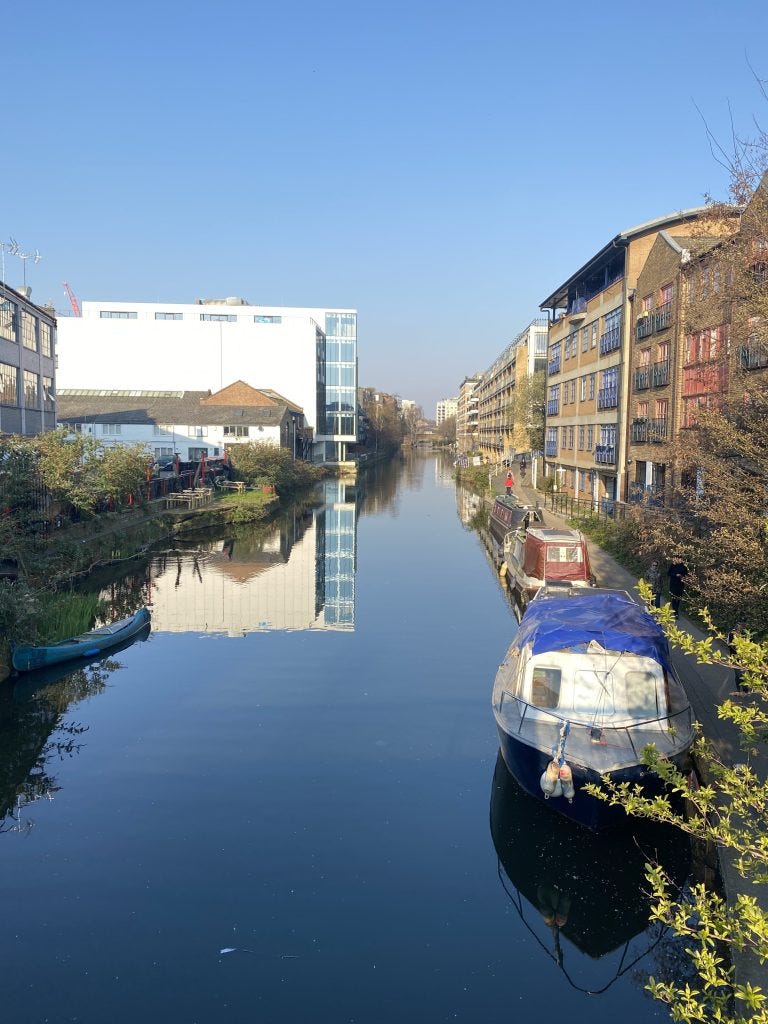Is It Ever Too Late Or Too Difficult For Your Next Work Life Chapter?

One year ago I wrote this:
We’re living in very difficult times right now, with countries throughout the world introducing the toughest measures affecting how we go about our daily lives, ever seen in peacetime. We’re anxious and fearful for vulnerable loved ones. Almost overnight our lives have slowed down dramatically, nearly to the point of standstill.
We’ve all become more observant of what’s happening around us. Through the stories being shared we have learnt we need to take Covid-19 seriously, and that we need to take responsibility for our own behaviour, because we’re all key players in fighting this as an army of individuals.
Through our observation and the stories being shared we have also learnt about the greatness of humanity through the care and kindness being shown towards fellow human beings. And through our observation and the stories being shared we are also seeing hope and recovery.
It is the worst of times, and it will get even worse, but it will also in time get better. And when this time comes, we’ll need to focus on our next WorkLife chapters, for now we can use this present time to learn through observation to help guide us in knowing what we want the next chapters of our WorkLife to be.
I had revisited and revised a blog post I wrote some years ago, based on the TV series The Waltons, which I included in my book Your WorkLife Your Way. The chapter is titled:
Is It Ever Too Late Or Too Difficult For Your Next WorkLife Chapter?
I’ll begin with a little:
Book Wisdom
The book Good Night John-Boy by Earl Hamner & Ralph Giffin. A celebration of an American family and the values that have sustained us through good times and bad.
The book includes a description of each episode of the TV series, which combined wonderful stories and “teachable moments” in which adults and children alike learned the importance of honesty, hard work, respect, responsibility, self-sacrifice, kindness, compassion and humility. As is true in most families, the Waltons faced many challenges, occasionally stumbled along the way, but they struggled to live their lives within the framework of the values they believed and taught.
The book introduces readers to the Hamner family members who later became characters on The Waltons. Richard Thomas who played John-Boy said: “It’s significant that the Waltons celebrated familism and healing during the tough times of the Great Depression.”
The Story Of The Waltons In The Most Difficult Of Times. Is It Ever Too Late Or Too Difficult For Your Next WorkLife Chapter? Case Study:
There have been many difficult times throughout history, perhaps none more so than the Great Depression followed closely by WWII. The Waltons TV series set during these times demonstrated how the family navigated their WorkLives during these difficult times.
When The Waltons first came to our screens it was set in the time of the Great Depression. Jobs were scarce, companies were closing down, and people needed to be creative in their thinking when it came to finding themselves a job or set up in business. Not so different to how it is now, really.
Then the storyline moved to World War II, which deeply affected the family. Their WorkLives became very different. It forced them to put aspects of their WorkLives aside or on hold. They had to diversify in line with the demands of the time. It was also formative in charting their immediate and pursuing WorkLife chapters.
What might have made it even more difficult for the Waltons was that they lived in a very small community, and so perhaps there wasn’t a lot of scope for enterprise. However when they did venture further afield to the bigger towns, there may have been more opportunities, but there was also more competition, again not so different to how things are now.
And yet they all managed to find work when they needed to. They were quite inventive about it really and managed to utilise, embrace and nurture their unique talents, skills and attributes, whether that was in their small community or when up against the competition in the bigger towns and cities.
The grandparents and parents instilled strong values in the children, along with a strong belief that they could achieve their heart’s desire. They recognised and encouraged the unique talents, skills and attributes within each child and gave them a supportive push in striving towards their goals.
They didn’t have the financial capacity to fund their education, but the belief they instilled in each child provided a greater capability to achieve the WorkLife they aspired to, far more than funding their education would ever have done. Each one worked hard for what they wanted, which resulted in even greater appreciation and gratification. I think the old adage of “give a man a fish and he’ll eat well today, teach a man to fish and he’ll eat well for the rest of his life” is appropriate here.
The grandparents, parents and in turn the siblings were a great support to each other along their WorkLife journeys. They were, I think, both mentors and mentees at various stages as they all supported each other in their learning, growth and development. As much as we’ve evolved since the time of the great depression, and WWII, and organisations are becoming more international and global, many things remain the same.
We all have the capacity to be both mentors and mentees, to share our knowledge, wisdom and expertise, along with our kindness, compassion and humility; and even among the international and global organisations there is space for the values and beliefs demonstrated in the Walton family. Simple perhaps, but as I think many of us have come to realise in an increasingly complex world ‘simplicity’ is becoming a key value.
Earl Hamner Jr. based the characters in The Waltons off his own family.
John-Boy: From a young boy he had a passion to become a writer, and began by recording his thoughts about his family, friends and circumstances, writing stories in a journal. He wrote and published his community and college newspaper. On graduating he moved to New York to fulfil his dream of becoming an author. After the attack on Pearl Harbour he enlisted in the military and wrote as a war correspondent for the U.S. Army’s newspaper Stars and Stripes. After the war ended, he returned to New York and turned his attention to reporting news. He went on to become a novelist.
Jason: Enjoyed composing music for harmonica, guitar and piano. He attended the Kleinberg Conservatory of Music. He joined the National Guard, and during the war became a sergeant in the army. He landed a job playing honkytonk piano at a local tavern, which he later came to own.
Mary Ellen: Followed her ambition to go into medicine, gained an education as a medical worker and became a nurse. Ending up taking care of people out in the country by herself, she concluded they needed more medical expertise than she could offer, and so she continued studying medicine until she succeeded in becoming a doctor.
Ben: Had an entrepreneurial spirit and embarked on various schemes, some more successful than others. He too fought in the war and was taken prisoner by the Japanese. Between times he ran the family sawmill in partnership with his father.
Erin: Worked as a telephone operator while finishing school. She struggled to find her place, as she wasn’t an academic like John-Boy, or musical like Jason, interested in medicine like Mary-Ellen, or entrepreneurial like Ben. She took a part-time job at a business college. When the owner saw her helping out at the unattended front desk answering and assisting callers, he allowed her to work her way through the business school. She went on to become an executive secretary, then personnel manager, going on to become the plant’s assistant manager. Later in life she earned a teaching certificate, leading her to become a school principal.
Jim-Bob: Was fascinated by aeroplanes and aspired to become a pilot. However increasingly poor eyesight forced him to give up this dream. He went on to become a mechanic and opened his own business.
Elizabeth: Had an inquisitive mind and a talent for writing. She joined the Peace Corp. A free spirit, she struggled to settle down and travelled the globe looking for adventure.
Like the Waltons, we will come through this difficult time, not unscathed, not without sadness and not without loss, but hopefully with a strong resolve to appreciate the simple things in life: spending time with family and friends; being involved in our local communities; passing the time of day with strangers; walking in the great outdoors; appreciating the beauty of what’s around us; and everything good that remains with us.
Sage Wisdom
- Remember you will get through this, and things will be alright again. No matter how difficult and uncertain everything is right now, darkness never prevails;
- Be kind, look out for each other. You won’t be the only one worried. Talking will help, sharing will help. Look out for your friends, your neighbours, people you hardly know, family, because in the end we’re all family;
- Stay strong, stay positive, you’ve got this.
During this enforced active WorkLife pause be open to experiences that require deeper thinking, let this guide your self-feedback to learning what you need to learn, and to knowing what you can do with the learning you already have within you, in a new and different context. Being observant will allow you to know what to do next to make the most of this WorkLife experience. Ask yourself:
What do I already know that I can adapt to this WorkLife experience?
What parts of this WorkLife experience are best suited to teach me what I want and need to learn?
Words of Wisdom
You are the author of your WorkLife story. This is not the end, it’s just the beginning.
One year on: I’m struggling to know what to add. I’m thankful that I and those close to me have come through it safely, but yet I’m anxious in writing that, I feel we’re not out of the woods yet, and I don’t want to tempt fate. So, for now, I don’t have anything to add … for now …
Instead, I leave you with the same poem from last year, which still feels relevant.
Epilogue
I leave you today with a poem by Laura Ding-Edwards
It feels like things are not ok
And this “thing” will never go away
Like all around is caving in
And no-one knows where to begin
What-ifs and fears are on the rise
And nobody’s able to disguise
The sadness of this sudden change
To life, routine; it’s very strange
But sit a moment with that thought
Forget the things that you’ve been taught
For a while there’s no rat race
A slower life put in its place
We suddenly have the space to stop
Appreciate the things we’ve got
The cusp of spring still breaks its sleep
Our birds return to trill & cheep
And hope and kindness start to bloom
And we find ways to life the gloom
And so in this uncertain time
Take stock, reflect and redefine
Keep in mind it’s not forever
We’ll make it through with love, together
Today’s featured book is: Good Night John-Boy by Earl Hamner & Ralph Giffin.
The story has been adapted from chapter 26 of Your WorkLife Your Way Is It Ever Too Late Or Too Difficult for Your Next WorkLife Chapter.
WorkLife Book Wisdom Stories:
The intention of the stories I share is to inspire you through people’s stories of their WorkLife experiences. Through these stories, you will learn about people’s dreams and ambitions, along with the challenges, obstacles, failures and successes they encountered along the road of their WorkLife journey. And how they used the power of book wisdom to help them find the inspiration and guidance to navigate their path to live their WorkLife with passion, purpose and pride.
My hope is that these book wisdom stories will help you throughout the chapters of your WorkLife Story.
I believe stories are a powerful mechanism for teaching, a powerful medium to learn through, and a powerful way to communicate who you are and what you stand for.
If you enjoyed this, please hit the *Clap* 👏 button as many times as you wish.




